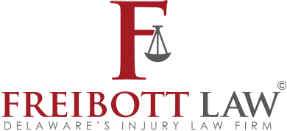Premises Liability is a legal term referring to injuries incurred on another person’s property due to unsafe conditions and neglect. Two common types of premises liability cases are slip and fall accidents and dog bites. Other types of premises liability cases include; swimming pool accidents, fires, explosions, roof cave-ins, inadequate lighting, inadequate security, assault and amusement park accidents. Any residential property, commercial building or open space can be the place of a premise liability accident including; offices, sports facilities, private homes, patient care facilities, nursing homes and treatment centers.
If you have been injured due to negligent property maintenance or upkeep, call a skilled Delaware Slip and Fall Lawyer. The Freibott Law Firm handles all types of personal injury cases including premises liability claims. Mr. Freibott, can be contacted at (302) 633-9000.





























